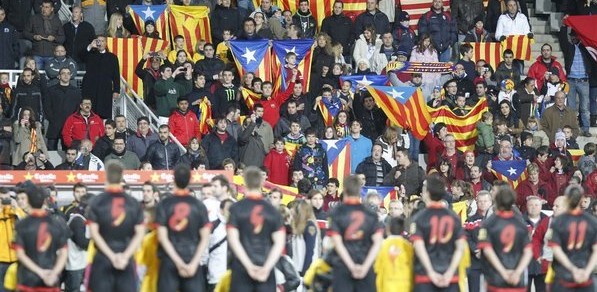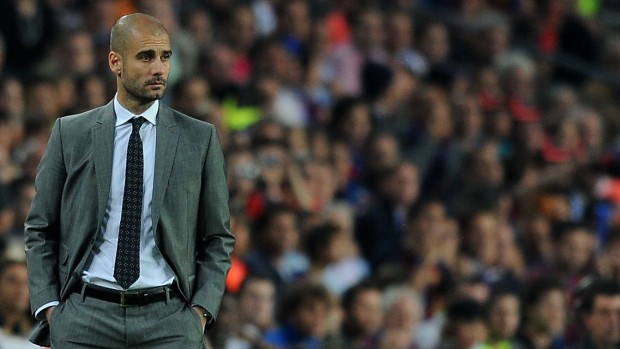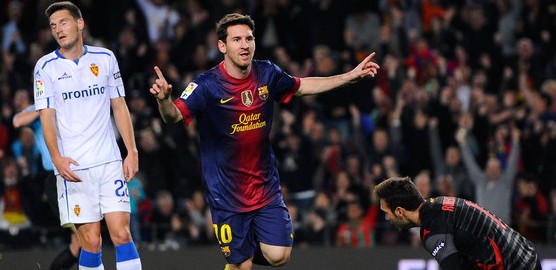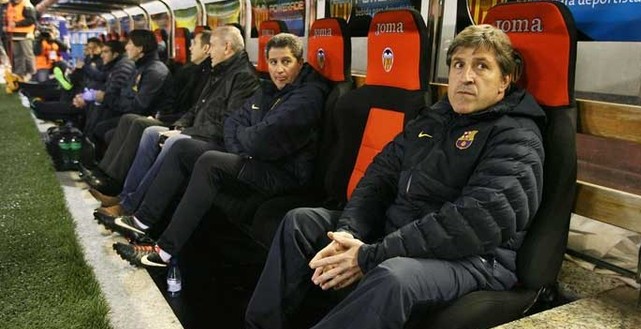- S.D. Eibar ready for maiden La Liga outing
- SD Eibar stengthen ahead of debut La Liga season
- Can ‘Super Mario’ live up to expectations in Madrid?
- MAN IN THE GROUND – Brentford 0 – 4 Osasuna
- Historic Basque derby welcomes S.D. Eibar to La Liga
- Munich to Madrid, via Brazil – Tony Kroos
- Rakitic in Spanish Switch
- Can Spain find redemption in Rio?
- Viva Espana! A season of redemption for Spanish football
- From the old to the new: who can fill the void in years to come for La Roja?
THE BATTLE OF MONTJUIC – Catalan national team continues to ask difficult questions
- By Lee Roden
- Updated: 30 December, 2011

As kick off approached at the Estadi Olímpic Lluís Companys, the empty spaces amongst the stands suggested for a moment that there might be an unusually poor turnout. Yet as the whilstle blew on Catalunya vs Tunisia, the number of latecomers became apparent, and the stadium finally filled with an estimated 37,000 spectators.
Catalunya traditionally play every December, with the occasional mid year fixture away from home. The venue of choice for this year’s winter match sits somewhat uncomfortably at the top of one of Barcelona’s mountains, Montjuic. Perhaps the traveling thousands had underestimated the length of time needed to treck up the side of the hill, but if they did they took little time to catch their breath, with cries of “Catalunya, Catalunya” and “independence!” soon ringing out amongst the stands.
In a first half marked by its intensity, it became apparent that this game was more than just a friendly for those involved. Tunisia, preparing for the 2012 African Cup of Nations, were clearly taking the contest seriously, and came in to the game off the back of a mid-week hammering of the Basque national team.
The Catalans weren’t idle either. A mixture of established veterans such as Sergio Garcia, Xavi Hernandez and Victor Valdes gelled with up and coming talents like Ferran Corominas (Girona) and Didac Vila (on loan to Espanyol from AC Milan). Catalunya deputy coach and assistant to Johan Cruyff, Oscar Garcia, commented that every player asked to participate for the Catalans had responded with a proud enthusiasm.
This would explain the discipline with which the team went about its task. The Catalans showed surprisingly few signs of their lack of match time together as a team, and instead exhibited an intensity of play, dominance of possession and pressure on the ball that suggested the players have a hunger to represent their nation with their heads held high.
To those familiar with the team this should be no surprise. Every year, Catalan players turn up for these games and prove to be true professionals without fail, eager to pull on the shirt inspired by the passion of a nation. As a result, it’s difficult to avoid the main question these fixtures raise: should Catalunya be one day granted entrance to FIFA?
It would be trivial to try and answer such a grand question in one piece, and indeed many have failed before. The question none the less remains more relevant than ever, as demonstrated by the seriousness with which this “unofficial” national team approached this fixture, and the true quality they displayed, despite being thrown together with little chance to train.
Banners in the crowd proclaimed “Catalunya at Brazil 2014” and “The hat trick we want: 1) Catalunya 2) Official 3) National Team”. The public are speaking, as are the Catalan Football Federation, who have launched a campaign with the goal being the opportunity to qualify for the next World Cup. Whilst this is probably unrealistic, it ensures that the debate remains present in the public consciousness.
What really assures the Catalan team is a serious issue in Spain is the quality of the footballers it can draw upon. With much of Spain’s double winning national team being made up of FC Barcelona players, the prospect of losing this spine in the unlikely event that Catalunya was granted official status would be terrifying for la roja.
In the second half, with the likes of Isaac Cuenca and Sergi Roberto joining the ranks, it became apparent that this Catalunya team has a next generation of talent, too. The big question is unlikely to go away as long as young Catalan footballers continue to play at the top level, and whilst Xavi and Puyol will one day no longer be able to pull on the shirt adorned by la senyera, there are youngsters of ample talent eager to fill their place.
What’s more, Catalunya have their own style, too. With Cruyff as coach it’s to be expected. Andreu Fontas, who played as a centre half in the first 45 minutes, was moved in to midfield and performed equally well alongside Joan Verdu and Sergi Roberto in the middle of the park. Martin Montoya likewise found himself playing in the front three as often as at the back. Total football remains the order of the day for Cruyff, and is the philosophy he continues to practice in his role in charge of the Catalans.
That’s not to say they couldn’t improve however. Set-pieces looked laborious and poorly worked out, something which would surely change if Cruyff was given the time normally allocated to an official national team with his players. A goalless draw marked by complete dominance of possession against a competitive Tunisia team is not to be scoffed at though, and it’s frightening to think just how good Cruyff’s team could be were they to be granted official status.
The 80% of the ball the Catalans saw in the second half suggests they have the tools to be a true force in world football. The Catalan media have this week been asking the question “if Catalunya becomes an official team, how good would they realistically be?”
Cruyff’s answer? “In the top six in the world”. It sounds arrogant, but it’s a real possibility. Whether we will ever find out is impossible to predict.
Follow @icentrocampista






You must be logged in to post a comment Login